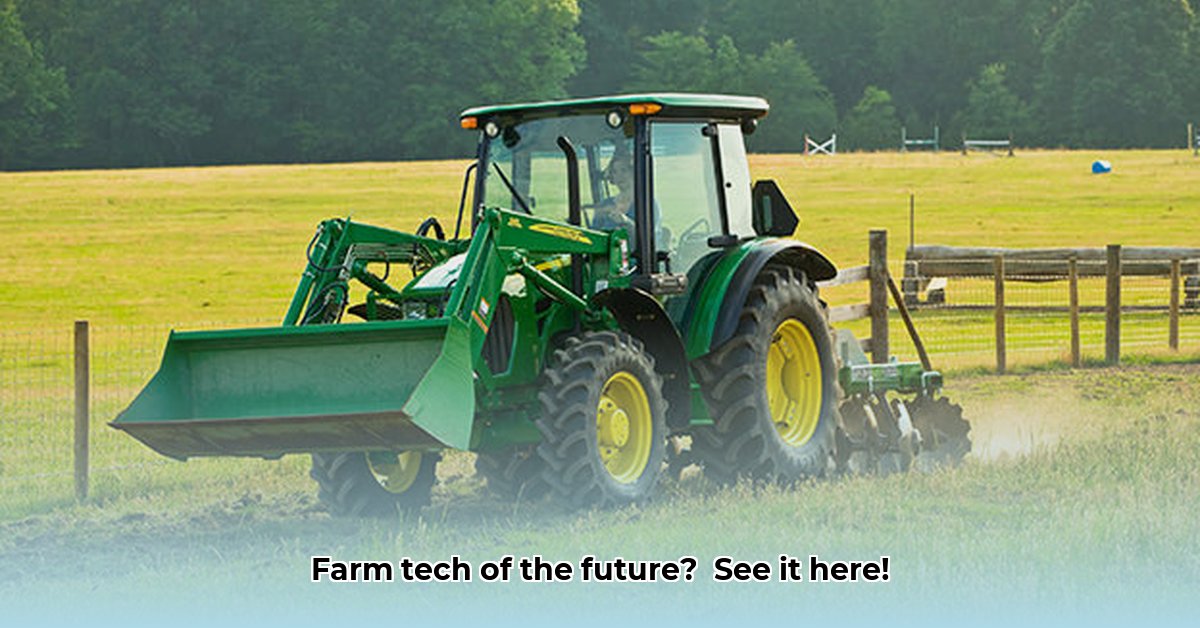
Tractor Technology: Revolutionizing Sustainable Agriculture
Farming is evolving rapidly, and the equipment powering this transformation is no exception. The modern tractor is no longer just about brute strength; it's a sophisticated piece of technology designed for efficiency, sustainability, and profitability. This article explores the latest tractor innovations, offering guidance to farmers of all scales on how to choose the right equipment for a thriving and environmentally conscious operation. For Kubota owners, explore snow removal attachments here.
The Evolution of Farm Tractors: From Horsepower to Precision Farming
The tractor's impact on agriculture is undeniable. From its humble beginnings, the tractor has evolved from a simple engine to a highly advanced machine incorporating GPS guidance, automated planting and harvesting, and fuel-efficient engines. This technological leap has dramatically increased productivity while minimizing the environmental footprint. Early tractors focused primarily on horsepower; today's models prioritize precision and sustainability, optimizing resource utilization and reducing waste.
How has this evolution impacted your farm's operations? Have you witnessed a significant increase in efficiency thanks to modern tractor technology?
Investing in the Future: Smart Tractor Technology and Its ROI
Upgrading to modern tractor technology is a significant investment, but the long-term benefits often outweigh the initial costs. Higher yields, reduced fuel consumption, and a minimized environmental impact contribute to a stronger bottom line and a more sustainable operation. However, understanding the intricacies of these systems is crucial. Training employees adequately on these complex technologies is essential to realize the full potential of your investment. This investment represents a commitment to both your farm's future success and the sustainability of the planet.
"The return on investment for precision agriculture technologies is significant, especially considering the long-term benefits of increased efficiency and reduced resource waste," says Dr. Anya Sharma, Agricultural Engineering Professor at Cornell University. "However, proper training and planning are key to maximizing ROI."
Choosing the Right Tractor: A Step-by-Step Guide
Selecting the appropriate tractor depends heavily on the size and type of your operation. A small family farm will have different needs than a large commercial farm. Here's a practical approach:
- Assess your needs: What crops do you grow? How many acres do you farm? What's your budget?
- Research tractor models: Consider horsepower, fuel efficiency, and available technologies. Compare specifications and read reviews from other farmers.
- Test drive before you buy: Hands-on experience is crucial; test several models before committing to a purchase.
- Seek advice from other farmers: Peer-to-peer advice can be invaluable. Their experiences can help you avoid potential pitfalls.
Modern Tractor Technology: Weighing the Pros and Cons
Modern features offer significant advantages, but it’s crucial to consider both the positive and negative aspects.
| Feature | Pros | Cons |
|---|---|---|
| GPS Guidance & Automation | Increased precision, reduced waste, higher efficiency, minimized labor needs | High upfront cost, complex technology, skilled operator requirement |
| Fuel-efficient Engines | Lower running costs, reduced emissions, environmentally friendly | Potentially higher initial purchase price |
| Reduced-Impact Tillage | Soil conservation, reduced erosion, improved soil health | May require specialized equipment, potentially lower initial yields |
Sustainable Farming Practices with Modern Tractors
Sustainable agriculture is paramount. Modern tractors play a key role through fuel-efficient engines and reduced tillage methods. Precision farming minimizes waste and optimizes resource management. However, remember that sustainable farming extends beyond the tractor itself; it's about the holistic management of your operation.
Did you know that adopting reduced-impact tillage methods can lead to a 20% reduction in soil erosion, according to recent studies by the USDA?
The Future of Farm Tractors: A Look Ahead
The future of farming technology is promising. Expect further advancements in autonomous tractors, AI-driven decision support systems, and enhanced data integration. These innovations promise even greater efficiency and sustainability. Increased connectivity between farm equipment and other systems will allow for fine-tuned management and optimization. This interconnected approach will be crucial in addressing challenges like climate change and resource scarcity.
Cost-Effective Sustainable Farming for Small Farms
Small farms face unique challenges when seeking sustainable and affordable solutions. Here's how to achieve both:
- Used equipment: Buying used equipment significantly reduces costs, but thorough inspections are vital.
- Alternative power sources: Explore electric and biofuel options, though they often involve higher initial investments.
- Smart technology adoption: Carefully evaluate if advanced technologies offer sufficient ROI for your scale of operation.
- Collaboration and resource sharing: Shared equipment purchases and rentals save money.
- Government support: Explore grants and subsidies.
- Phased approach: Implement sustainable practices gradually.
Key Takeaways:
- Small farms need efficient, affordable, and eco-friendly technology.
- Used equipment and shared resources offer substantial cost savings.
- Multi-functional tools maximize the return on investment.
- Government funding can significantly reduce costs.
- A phased technology adoption strategy is often most effective.
The evolution of tractor technology is reshaping modern agriculture. By carefully considering your specific needs and the potential benefits of modern advancements, farmers of all sizes can improve their efficiency, bottom line, and contribution to a more sustainable future.